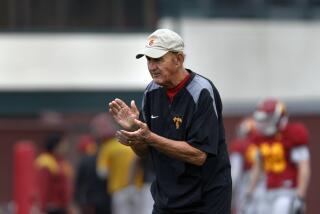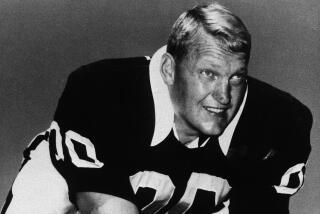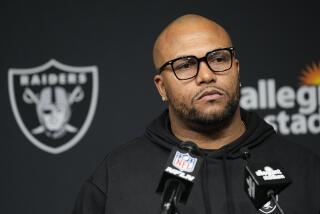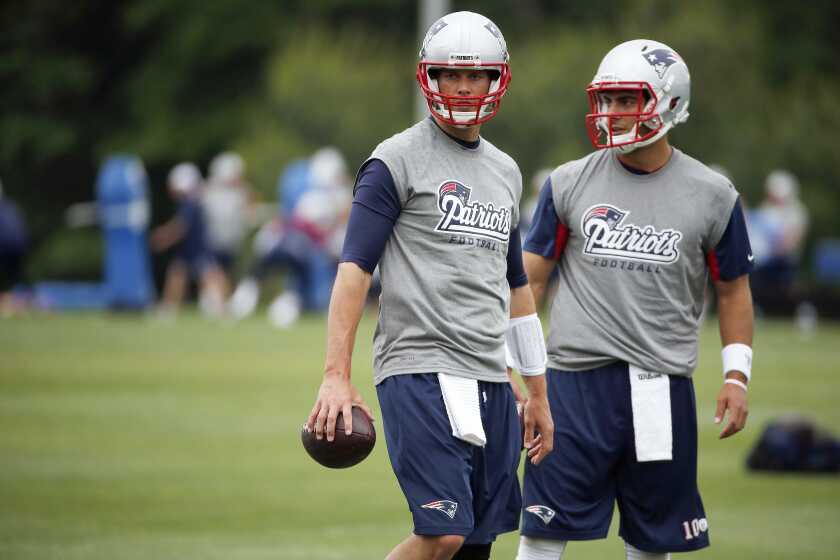Taking a Familiar Route to a Rout in Super Bowl
SAN DIEGO — Over the years, Super Bowls have produced one recurring phenomenon: the unanticipated blowout. And it always happens for the same reason:
The team that falls behind, realizing that it isn’t quite good enough, tends to lose heart, as the Raiders did Sunday, understanding that the big dream of a championship isn’t going to happen.
At the same time, the other team, which might well have had some doubts about itself going into the first kickoff — particularly after lining up as the underdog, as the Tampa Bay Buccaneers did this time — feeds on its success.
Gaining strength from a sudden prosperity that it hadn’t expected, it attacks with more confidence and plays even harder than usual, as the Buccaneers did, and, in a wink, that team is on a roll.
That’s how an overachieving defense-oriented team from Baltimore gathered itself only two winters ago to smash the New York Giants by 27 points.
And it happened again here in Super Bowl XXXVII, when, on the way to a 48-21 rout, the Buccaneers opened a 34-3 lead with 20 minutes to play.
Because the Raiders are the NFL’s best passing team — and because they have so many good veteran players — they did, in the time that remained, regain some respect, show some character and score some points. But it was too late. Heavy of heart, outplayed by one of the great defenses of all time, the Raiders never had a chance.
It was Tony Dungy, this season’s Indianapolis Colt coach, who built that Buccaneer defense in the seasons from 1996 to 2001 when he coached at Tampa. Hiring virtually all of the players on the Buccaneer defense Sunday, Dungy also designed the scheme that strangled the Raider offense.
Moreover, the players on offense are mostly his.
Dungy, however, a laid-back gentleman and scholar, has never been able to win a Super Bowl himself. It took a young fire-eater named Jon Gruden to supply the one thing the Buccaneers were lacking in all their years with Dungy — an emotional approach that so often makes the difference in football.
Clearly, Gruden’s rah-rah-go-get-’em notions caught on with Dungy’s players and made them into champions.
Intellectually, this is the same team that couldn’t win last season. Emotionally, it’s a new team, which, surely, is the way Gruden planned it.
Gruden never could have done it, though, without Dungy’s contribution. For example, you couldn’t play for Dungy if you couldn’t tackle — no matter how much talent you had. And you couldn’t play for Dungy unless you had some speed — no matter how much style you had or how many other fine qualities you brought to work.
The Buccaneers aren’t as fast as they looked in this game because the Raiders are so slow. But they’re fast enough.
Otherwise, the way Dungy put together the Buccaneer defense was most visible in these respects:
The Raiders couldn’t throw their usual short passes because the Buccaneers placed five fast linebackers and cornerbacks in the five short passing zones.
The Raiders couldn’t throw downfield because the Buccaneers’ rush line was on top of quarterback Rich Gannon before he could get the ball off.
The Raiders couldn’t run the ball because the Buccaneer line slanted hard to the left or right on every snap while the Buccaneer linebackers compensated in the other direction. Every time Raider halfback Charlie Garner got a handoff, he ran into one group or the other.
Add Gruden’s emotion, and it was enough to win a Super Bowl.
Here’s the thing to keep in mind about the Raiders: Succeeding the St. Louis Rams, they became the passing team of 2002, and, as such, won the AFC championship.
With one of the finest short-pass attacks organized, they beat enough good defenses to reach the Super Bowl, where they learned, as early as the first quarter, that they couldn’t beat a super team.
The Raiders’ two weaknesses were more than their leaders, Gannon and Coach Bill Callahan, could overcome. First, and most significant, they weren’t fast enough. Second, they don’t have a ground offense to integrate with their overhead offense.
Passing is the way to go these days to win pro games — Tampa Bay quarterback Brad Johnson, an ordinary player, got off enough passes to help his defense construct this rout — but a passing team such as the Raiders needs some kind of running threat to be a champion.
Maybe next year.
More to Read
Go beyond the scoreboard
Get the latest on L.A.'s teams in the daily Sports Report newsletter.
You may occasionally receive promotional content from the Los Angeles Times.










